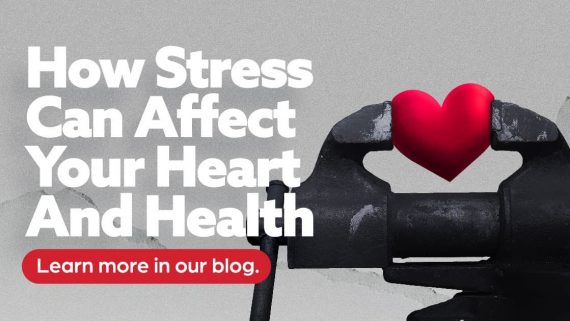We all experience stress, and it’s more prevalent these days amid the COVID-19 pandemic. However, long-term exposure takes a toll on our physical and mental health. Knowing how stress can affect your heart and body can be the biggest inspiration in finding healthy ways to reduce it. This is the message at the heart of the Stress Awareness Month initiative that kicks off every April.
Fight-Or-Flight: The Stress Response
The stress response is a series of changes that occur in the body to take care of a real or perceived threat. Stressors are different for everyone and are any situations a person perceives as mentally or physically terrifying. When a stressor triggers our stress response, our body goes into fight-or-flight mode. Your heart beats faster, breathing increases, and muscles tense up. Once the threat is gone, the body functions return to normal.
The stress response is a short burst of heightened awareness that dissipates with the threat. In today’s world, there are fewer physical and more psychological stressors such as:
- Parenting
- Financial issues
- Family or relationship difficulties
- Pressure at work
The Constant State of Heightened Awareness

Some stressors can take a while to resolve, meaning the threat is always present. It also means the stress response stays on, and the body is in a constant heightened awareness state. Long-term exposure to chronic stress takes a toll on the mind and body. Irritability, anxiety, depression, and insomnia are some of the mental health symptoms of chronic stress. No system in the body is safe from the effects of stress. At the same time, it also increases our risk of certain conditions. For example:
· Muscles– Contracting the muscles for prolonged periods can lead to tension headaches and migraines.
· Heart– Stress increases the heart rate and strength at which the heart muscle pumps. Doing this increases the size of the blood vessels and arteries. This raises the blood pressure and can eventually damage the blood vessels and lead to heart disease.
· Liver– The energy boost during the stress response comes from the liver, increasing the blood sugar it produces. Over time, higher blood sugar levels significantly raise your risk for type 2 diabetes.

You Can’t Avoid Stress, But You Can Manage It.
You can’t always avoid every stressful situation. Therefore, we have to learn effective ways to manage stress and reduce its effects on the body. Though every person’s needs will vary, a healthy diet, regular exercise, and relaxation techniques are some coping strategies helpful in managing stress.
Living with a chronic health condition can be stressful. Participating in clinical research studies can help you prioritize your health while you help advance care options for your condition. Volunteering also has many mental health benefits and has been shown to reduce anxiety and depression.

Visit our website to view a list of enrolling studies in your area today!
Sources:
https://www.heart.org/en/news/2020/02/04/chronic-stress-can-cause-heart-trouble
https://www.verywellmind.com/stress-and-health-3145086

